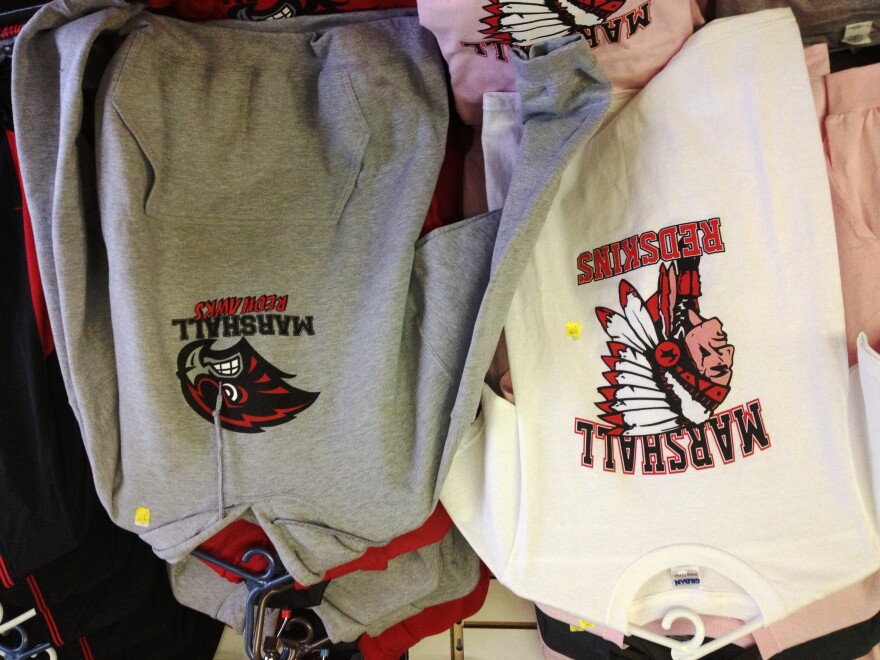For years, the debate about using American Indian names and imagery for sports teams has centered on the question of whether they create a “hostile environment” for Native American students. Courts have been split on that question, and so has public opinion – even among American Indians.
Now, state civil rights officials say there’s new evidence that the use of those mascots and nicknames affects student learning. So they want nearly three dozen Michigan schools to change their team names.
But the move has stirred up a hornet’s nest among some school officials and lawmakers.
A helping hand, or a big stick?
“It’s unprecedented, it’s irresponsible, and it’s short-sighted,” said State Rep. Lisa Lyons (R-Alto). Lyons also heads the House Education Committee. She says she’s heard from a lot of superintendents since the Michigan Department of Civil Rights submitted a complaintto the U.S. Department of Education earlier this month.
“I think everybody is just shocked and angered. And they should be,” Lyons said. “Anytime we’re talking about the state government asking the federal government to not send funding to our students is definitely cause for concern.”
Officials with the Michigan Department of Civil Rights say way too much focus has been put on the prospect of financial penalties for schools. They say short of absolute defiance, no school would be at risk of losing its federal funding.
But department spokeswoman Leslee Fritz says schools need to make some difficult changes, and they need help doing it.
“We really believe that the U.S. Department of Education is the right venue because it takes the issue of the emotion of the local community, and it creates a national solution for what is not a uniquely Michigan problem.”
A painful transition, and long memories
If you want to know just how big a deal changing a school mascot can be, visit Marshall, Michigan.
“Marshall Redskins went through that process and it was very divisive,” said Superintendent Randall Davis. “This started in 2002. I came on in 2009 and it was still a very sensitive issue, and it continues.”
The name change is almost a decade old. But if you walk into the local hardware store,you can choose from sweatshirts emblazoned with the Redhawk or the Redskin. A clerk there says Redskins gear outsells the new mascot by about nine to one.
“In our hearts we will always be Marshall Redskins,” said Greg Gordier over a beer at the local brew pub. He graduated from Marshall High, played cornerback for the football team, and uses the present tense when he refers to the old mascot. “As Redskins, we are not degrading the American Indian. We are immortalizing them. It’s a positive thing.”
Of course not everyone sees it that way, whether the mascot in question is the Redskins, which has a pretty clear history as an ethnic slur, or is something more innocuous – like “Indians” or “Chiefs.”
Former Marshall school board member Steve Rhodes says that disconnect led to a sort of feedback loop of misinterpretation and hurt feelings back when the issue came up in his community.
“It is the idea that ‘I don’t mean it that way. That’s not what I mean. If you take offense to it, that’s your problem,’” said Rhodes. “That’s not how communication works.”
Rhodes is a retired professor of communication, so he’s got some credentials to back up his observation. He’s also pretty qualified to talk about what happened in Marshall ten years ago. He was one of four school board members who were recalled for voting to change the Marshall Redskins name.
And things can get worse than recalls. Dan Levy of the Michigan Department of Civil Rights says in another town that considered a name change, outbuildings got set on fire, and dead rabbits were placed at people’s doorsteps.
“All that is what happens when we let communities talk about the issue on their own in a confrontational way,” Levy said. “That’s what we want to avoid. “
Levy say the feds can act as a neutral broker to help communities through the change.
But that argument is not exactly going over well.
“We’re all on the same team”
“It’s more than a little bit frustrating,” said Gladstone schools superintendent Jay Kulbertis about his reaction to being named in the Department of Civil Rights complaint. Gladstone, in the Upper Peninsula, has been the home of the Braves since 1932.
“The Brave moniker was chosen for what it stands for: bravery, integrity, honor, and respect,” said Kulbertis, adding that the name was selected with the participation of Native Americans from the community, and that the tribe re-designed the school's emblem in the 1990s. He says the first call he made after seeing the complaint was to the tribe.
“They were shocked by the complaint, in that they fully support what we … when I say ‘they’ and ‘we’… we’re all in this together,” Kulbertis said. “There is no they and we. For lack of a better term, we’re all on the same team.”
State Civil Rights officials say they’ve asked the U.S. Dept. of Education to make allowances for communities like Gladstone that have their local tribe’s support. But Kulbertis says by getting named in the complaint, at least some damage has already been done.
“I’m guilty in the court of public opinion,” he said. ”I’m on the list!”
The Department of Education is expected to decide in the coming weeks whether it will take the complaint. If it does decide to direct schools to drop their Indian monikers, it would likely mean changes beyond just Michigan.
And that will mean some tough conversations nationwide about just how powerful words and pictures can be.



